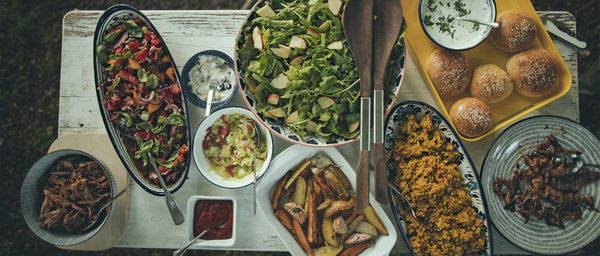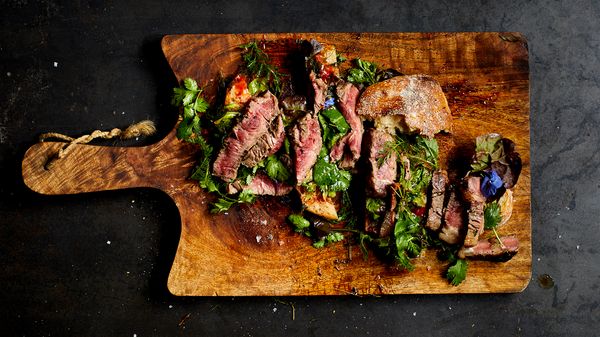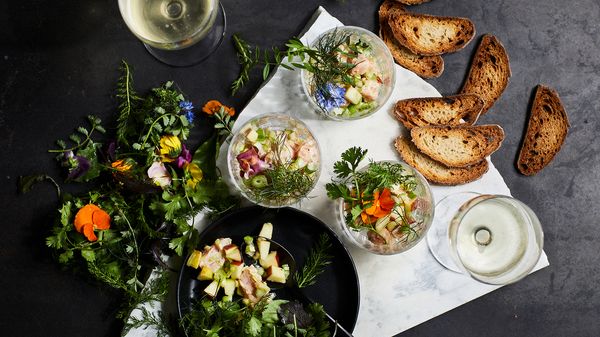Top chef Markus Sämmer has worked in the best kitchens in Munich, but for him real happiness lies in van life minimalism – in the Alps as well as in Australia. He prefers to cook under the stars, somewhere out in the wilderness. Only using what nature offers him and what he has grown, gathered, fished or killed himself.
He is an artist in the kitchen, but also a keen alpinist, mountain biker and free-rider.
‘For me, cooking is craftsmanship, intuition and inspiration’
Just a few meters away from his camper van, the fire crackles, while the flames transform the moment into a play of light and shadow with a view of the Ammergau Alps. In the powerful hands of Markus Sämmer, the mighty Japanese Santoku knife looks like a piece of delicate carving cutlery. The sleeves of his checked shirt are rolled up and his strong forearms betray the fact that this man can get to grips with pretty much anything. With impressive ease and sensitivity, and under the glare of his head torch, he carves the trout that we pulled out of the River Ammer that afternoon.
While pasta aglio e olio with Parmesan may be the height of culinary sophistication for many in the cooking area of their motorhome, the outdoor chef loves the challenge of his van’s spartan cooking area. ‘In my opinion, the art of good cooking lies in creating exotic dishes with locally sourced food. Even if the kitchen is tiny.’ Rainbow trout ceviche, one of his favourite dishes, is but one example. On a large, finely grained oak board, Markus Sämmer cuts the fish into large cubes, mixes them in a bowl with lime juice, onions and chilli, and places them in the small refrigerator of his van.
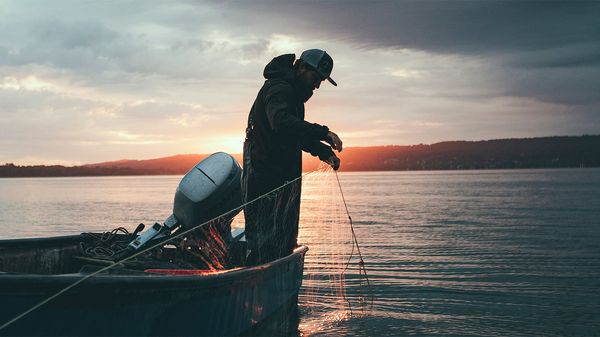
The meat is then cooked in the oven until it reaches the ideal core temperature. For a rare steak, this is between 48 and 55 degrees, medium is between 56 and 59 degrees, while well done is between 60 and 62 degrees. Once the desired degree of doneness has been reached, remove the meat from the oven and allow it to rest for a few minutes. Tip: if you want to add salt, pepper and other seasoning, only do so after cooking to allow the meat to develop its full flavour.
We gaze into the flames. With a glass of red wine in our hands we sit on a few fallen tree trunks and enjoy the tranquillity. It is the kind of moment where you feel like you are in the right place at the right time. From a basket, Markus takes a few currants he picked that morning in his garden by the lake known as Ammersee, and washes them. The coriander needed to create the perfect ceviche also comes from his own garden. Whether gathered wild herbs and mushrooms, honey from his five beehives, eggs from his chickens, the trout he caught himself or the hunted wild duck – Markus Sämmer hardly serves anything on his plate that he has not procured himself. The native of Munich has never left behind his family roots by Ammersee and yet has explored the world on countless journeys. For many years, he cooked in kitchens at the finest addresses in the Bavarian capital – from the Hilton to Dallmayr. But after years of working six-day weeks and 16-hour shifts without time for friends, Sämmer had finally had enough of Munich’s gastronomical life. He decided to flee to Australia. Taking the camper van down under, surfing, exploring the outback – and doing a lot of outdoor cooking for himself and like-minded people, with a sense of fun and no pressure. ‘It felt like the ultimate form of freedom,’ he says, looking back.
Between base camp stove and sous vide cuisine
This freedom in the mind is also what constantly inspires him to come up with new creations. It is the combination of the bountiful experiences in natural surroundings and the minimalist idea that materialises in the barren wilderness: the height of happiness is to get by on very little and still not miss anything. Sämmer experienced this during an expedition in Peru in 2011 and it had a profound impact on him: ‘It was undoubtedly my biggest mountaineering challenge and my longest and most extreme break in the great outdoors,’ he says. He and his team scaled six 6000-metre peaks during this time, technically the most difficult mountaineering challenges on the Alpamayo, including eight demanding pitches in the steep ice: ‘Expeditions are always a balancing act – also psychologically.’
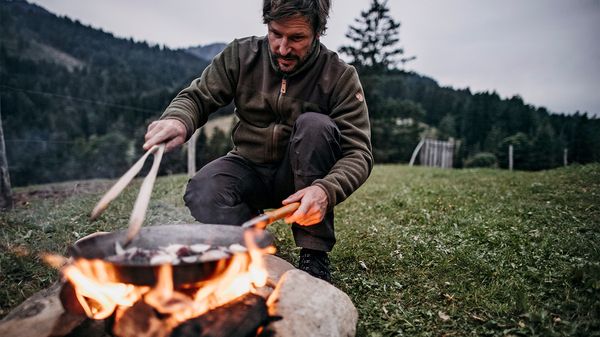
Always in mind: an intact ecosystem
Sämmer is clearly a man of the mountains, yet he is also a passionate angler: ‘I caught my first fish, a small perch, when I was four years old, together with my grandfather,’ he says. To this day, he loves to catch dinner from a mountain lake or river while fly-fishing. ‘On a skiing tour with friends on the Lofoten Islands, I had my fishing rod with me and after the last descent I cast the line down by the fjord.’ The Norwegian coast is famous for its abundant cod stocks. ‘It is OK to eat these saltwater fish,’ he says. Yet he is highly critical of the practice of overfishing the oceans. ‘It makes no sense to eat salmon in the Alps when you have the best whitefish, char and trout from sustainable fishing sources right on your doorstep.’ He disappears into the camper van, removes the almost finished ceviche from the small fridge and adds currants, a little oil, a few celery leaves and some coriander, dishes up everything onto plates and hands them to us. A dish made by the top outdoor chef under the stars – there it is again, that feeling of being in the right place at the right time. I think it is also known as luck.
‘Food plays a key role. After all, it appeals to our reward system. And this is particularly apparent when you have just scaled a difficult summit,’ as he knows all too well from experience. The most creative ideas for new dishes come to him on the way back down, while hypoglycaemic and completely exhausted. Delayed gratification can be an amazing source of inspiration.
And this is how Sämmer playfully alternates between minimalist base camp facilities and professional kitchens in high-class eating establishments. That is his trademark. ‘For me, cooking is craftsmanship, intuition and inspiration,’ he explains. When asked about his ‘ideal’ kitchen, however, nobody is left in any doubt. There has to be a large hob, ideally gas-fired. In addition, there should be a strong extractor hood, preferably directly above the hobs, a large dishwasher, a good oven and a first-class vacuum sealer for preparing his beloved sous vide cuisine. ‘With fresh ingredients, sous vide is perfect for intensifying the taste and preserving the bite of vegetables,’ he says. The way in which he embraces the Alpine region, his love of sports in nature and his trips to places like Morocco, Norway or South America have changed his cuisine in recent years – Sämmer works even more consistently with ingredients that spring from the ground regionally and grow locally. Instead of the grand cooking adventure with exotic fruits and exclusive fish or meat variations, he prefers the culinary ‘micro adventure’ – a festival for the taste buds from the treasure trove of food available on his doorstep. ‘My cooking has become more “earthy”. There are Mediterranean influences, but Moorish cuisine has equally inspired me.’
